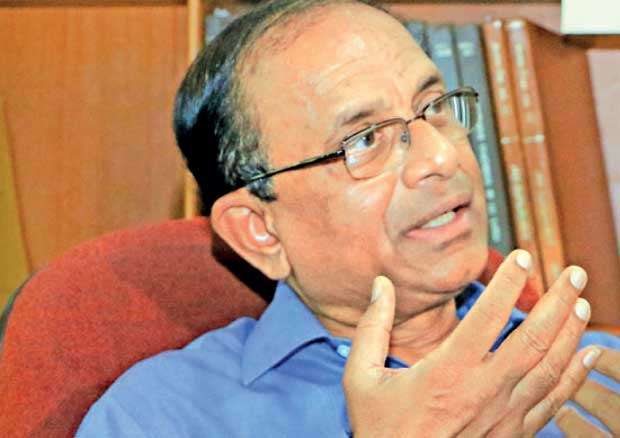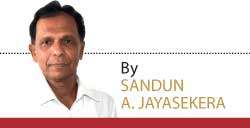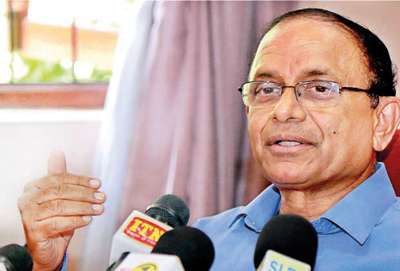25 Jul 2018 - {{hitsCtrl.values.hits}}

 The Constitution making process is in limbo right now and the ‘Yahapalana Government’ seems quite contended with the passing of the 19th Amendment to the Constitution. Attempts to introduce a new Constitution has come under much criticism by many in the country. The Daily Mirror spoke to the main architect of the drafting of a new Constitution for Sri Lanka, Parliamentarian and Constitutional expert Dr. Jayampathi Wickramarathna on the issue.
The Constitution making process is in limbo right now and the ‘Yahapalana Government’ seems quite contended with the passing of the 19th Amendment to the Constitution. Attempts to introduce a new Constitution has come under much criticism by many in the country. The Daily Mirror spoke to the main architect of the drafting of a new Constitution for Sri Lanka, Parliamentarian and Constitutional expert Dr. Jayampathi Wickramarathna on the issue.

Q What is the progress that has been made in drafting a new Constitution by now?
At the second sitting of the Constitutional Assembly held on May 5, 2016 six Sub-Committees were appointed to assist the Steering Committee in its mandate of drafting a constitutional proposal.
The six sub-committees were tasked to discuss and make proposals on Fundamental Rights, The Judiciary, Law and Order, Public Finance, Public Service and Centre – Periphery Relations.
Each Sub -Committee consisted of 11 members, including the Chairman, as resolved by the Steering Committee at its sitting on May 04, 2016 and subsequently approved by the Constitutional Assembly. The appointment of members to the Sub-Committees was done in an equitable manner taking into consideration party representations within Parliament, and was based on nominations made by political parties. The six Chairmen were appointed from among the members selected to the Sub-Committees and was based on considerations of seniority.
The Expert Panel has been working tirelessly and on last 18th met once again and requested for two more weeks. I must say that the Expert Panel has only a Zero Draft’ or ‘Non Paper’ right now before them for the purpose of facilitating future talks.
The Sub-Committees were mandated to develop constitutional principles for consideration of the Steering Committee in respect of the designated subject areas. The Sub-Committees functioned independently in determining the manner in which sittings were organized, and were at liberty to engage expertise and to invite representations. The deliberations before the six Sub-Committees were consultative and interactive in nature and included shared experiences and insights on various aspects of the subject matter discussions.
The six sub-committees submitted their reports in the end of September, 2017 to the Constitutional Assembly and as expected different political parties had aired their different views in these reports.
I must admit that after the submission of sub committee reports, the progress on Constitution making process has not been fast tracked. The local government polls and the No-Confidence Motion against Prime Minister Ranil Wickremesinghe also played a role to slow the progress.
However, in May 2018, the Panel of Experts of the Constitutional Assembly requested to prepare a document – an initial legal draft – based on proposals of the six sub committees that includes various views expressed by various political parties.
The Expert Panel has been working tirelessly and on last 18th met once again and requested two more weeks and was given. I must say that the Expert Panel has only a Zero Draft’ or ‘Non Paper’ right now before them for the purpose of facilitating future talks.
Q One of the major challenges before you is to come up with a basic Constitutional Policy that could garner the support of a two thirds majority in Parliament and political parties, clergy and Maha Sangha in particular. Many who oppose the new Constitution say that you are in a move to divide the country. How are you going to confront this uphill task?
Only a very small section of people say there is an attempt to divide the country. A vast majority of Tamils accept that Sri Lanka must continue to remain as an undivided and indivisible country. The TNA also is in that position. The Federal Party, which is the main constitutional partner of the TNA was taken to the Supreme Court alleging that they were in a move to divide the country. The Supreme Court having gone through all materials put before it rejected that application. A few of those who allege that there is an attempt to divide the country through devolution are Sinhala Buddhist supremacists.
The Interim Report of the Steering Committee has very clearly said that Sri Lanka should remain as an undivided, free, sovereign, independent and democratic socialist republic. There should be constitutional provisions to prevent cessation that people enjoy sovereignty as a whole. The power to change the Constitution shall remain with the central legislature and people of Sri Lanka.
They believe that Sri Lanka must be in the control of the Sinhala Buddhists. There is no single example in the world where part of a country has used devolved power to break away. In Scotland in the UK power has been drastically devolved not because of devolution alone but because of territorial reasons. In Catalonia, the cry to break away from Spain has got heightened because the central Spanish authorities have been insensitive to Catalonian concerns and complaints at the center has been very inflexible. Like in Sri Lanka, the Central Government in Spain has found various ways and means to frustrate devolution. But if it is even a small part of Sri Lanka, general thinking is that devolution may lead to cessation and as such we must address that concern. The Interim Report of the Steering Committee has very clearly said that Sri Lanka should remain as an undivided, free, sovereign, independent and democratic socialist republic. There should be constitutional provisions to prevent cessation that people enjoy sovereignty as a whole. The power to change the Constitution shall remain with the central legislature and people of Sri Lanka.
The Provincial Councils have no role in Constitution making. So, it is very clear that Sri Lanka will continue to be a unitary state. In March, 1990 when the Chief Minister of North-East Vardharaja Perumal made his ill advised statement to declare Unilateral Independence in North East, President Premadasa wanted to dissolve the North-East Provincial Council. But the 13th Amendment did not have such provisions, and special laws had to be introduced. However, it was not a Constitutional amendment. The Steering Committee has in its report proposed that the Executive President should have the power to intervene in a province when there is a clear danger to the territorial integrity and sovereignty of the country. The Executive President can take over all or part of the functions of a Provincial Council under the proposed Constitutional arrangement or ultimately dissolve the Council. So, what’s more?
I must say the best proposal for meaningful power devolution came from 7 Chief Ministers of the South. Their proposals are based on 30 years of experience. They have made very good suggestions and all 7 Chief Ministers are from the SLFP.
But I am sorry to say that the SLFP’s own proposals contained in the report don’t go that far although they are not opposed to devolution.
 Only a very small section of people say there is an attempt to divide the country. A vast majority of Tamils accept that Sri Lanka must continue to remain as an undivided and indivisible country. The TNA also is in that position.
Only a very small section of people say there is an attempt to divide the country. A vast majority of Tamils accept that Sri Lanka must continue to remain as an undivided and indivisible country. The TNA also is in that position.
Q Is it going to be a federal system of governance, unitary state, confederation or a union of regions?
It is certainly a unitary state with meaningful devolution. I speak for my party, the United Left Front and LSSP majority group. If I was asked to sum up the aspirations of the people on January 8, 2015, I would say ‘Democracy’. So, you want a democratic Constitution.
Development must not be exclusively centric. The President may be given certain powers in relation to PCs. But the President may be elected by Parliament. Colvin R De Silva once said that ‘You must never have 2 powers at the apex of the state which act as counter-force to each other.’
The Bill of Rights, brought afresh to the proposed draft includes not only political rights but social, economic, cultural, women and children’s rights, and that is the trend world wide.
Q The Constitution and the electoral system are closely linked components in a parliamentary democracy. The Proportional Representation (PR) Voting system has come under a lot of criticism from almost all quarters. To add insult to injury, the newly introduced local government electoral system under which the February local government polls were conducted has also been criticized by voters, political parties, members of the local government bodies and many others. How are you going to tackle this problem?
We are for a new electoral system. A mixed system based on PR and First Past the Post System. The ‘Manape’ System must come to an end.
Development must not be exclusively centric. The President may be given certain powers in relation to PCs. But the President may be elected by Parliament. Colvin R De Silva once said that ‘You must never have 2 powers at the apex of the state which act as counter-force to each other.’
Q Sri Lankans will in future have as their Head of State a more powerful President or a President weakened further or a ceremonial Head of State with a Prime Minister with executive powers?
We don’t want power to be centralized in one person or parliament without safeguards. The Power is to the Centre and Province. The subjects of National Security, Sovereignty and Territorial Integrity remain with the centre. The centre should have the power to make National Policy and Standard on all subjects, but the centre must not take back devolved power in the guise of national policy.
There is no concept called Executive Prime Minister - nowhere in the world. It is Parliament which will exercise executive power through the Prime Minister and Cabinet. The Prime Minister will have to go home at any moment if he loses confidence of Parliament.
Q The two party rule, the unity government or so called Yahapalana Government has been proved a flop. Do you agree?
Yes, to some extent. The 19th Amendment to the Constitution has certain flaws because we were not able to fulfil the aspirations of people and fully abolish the Executive Presidency for which President Maithripala Sirisena was voted on January 8th, 2015. That was because the government did not have a simple majority, let alone a 2/3 majority. Anyway it is a new experience for the two parties. Unfortunately, our political culture does not support such arrangements because both parties are looking forward to the next election.
We don’t want power to be centralized in one person or parliament without safeguards. The Power is to the Centre and Province. The subjects of National Security, Sovereignty and Territorial Integrity remain with the centre. The centre should have the power to make National Policy and Standard on all subjects, but the centre must not take back devolved power in the guise of national policy.
Q Are you confident that the new Constitution could be introduced before 2020?
The 10 experts nominated by the Steering Committee and drawn from various professions like engineering, legal, political and academia, with different backgrounds are working on an initial draft based on interim report and 6 sub committee reports which can also be called as a Zero Document or Non Paper to facilitate further discussion. Two of them have already submitted their individual reports.
I must categorically say that Mr. Sumanthiran or myself are not involved in the expert committee work as they work independently, though the joint opposition tries to show a different picture.
The Steering Committee has decided to prepare a final report and we have no involvement in that process either and we have explained this in Parliament last week. The ball is in their court now.
10 Jan 2025 28 minute ago
10 Jan 2025 2 hours ago
10 Jan 2025 2 hours ago
10 Jan 2025 4 hours ago
10 Jan 2025 4 hours ago